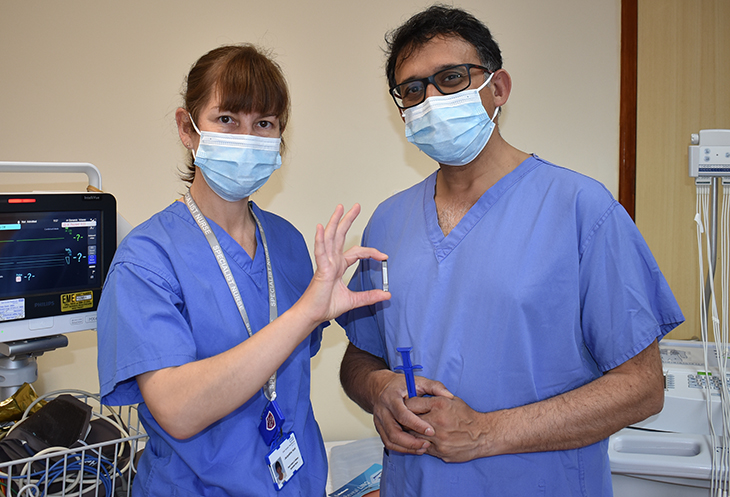A new heart rhythm pathway, set up a year ago at the Trust to monitor stroke patients, has proved to be successful at identifying earlier a group of patients at potential risk of another stroke due to their abnormal heart rhythm (arrhythmia).
The cause of some patient’s stroke is unexplained. In those cases, a heart monitor, the size of a two matchsticks, is implanted just under the skin by a specialist nurse before they leave hospital to monitor their heart rhythm remotely.

Jacqui Hunt – Heart Failure and Devices Specialist Nurse, with monitor implant and Professor Nikhil Patel – Consultant Cardiologist
During the first year of this new patient pathway, 75% (9 out of 12) of stroke patients were identified with an abnormal heart rhythm within three months of their initial stroke. Previously, a heart monitor was only implanted in selected patients three months after their initial stroke requiring them to come back into hospital for a procedure. Identifying patients enables early treatment to be undertaken to correct their heart rhythm helping to prevent a further stroke.
During the first wave of the Covid pandemic there was limited cardiac outpatient monitoring. Working together the cardiology and stroke team introduced this new pathway. There has been a multidisciplinary approach with a specialist cardiac nurse taking a lead in the device implantation. This has resulted in an improved patient experience and a higher quality service. East Sussex has been nationally recognised as introducing a best practice pathway in the recent NICE guidance.
Professor Nikhil Patel, Consultant Cardiologist and Head of Cardiovascular services said: “Limited diagnostic testing availability and people’s reluctance to attend hospital during the first wave created an opportunity to introduce this pathway sooner than we had originally planned. It has proved to be very successful at identifying patients a lot sooner where their arrhythmia could potentially lead to another stroke and allows us to undertake preventative treatment.”
Julie Noble from Eastbourne, is an ex stroke patient who received her monitor before she left hospital. She said: “To suffer a stroke was totally unexpected but having this monitor implant constantly tracking my heart beat gives me a great deal of comfort. Knowing that the doctors and nurses at the hospital are keeping an eye on me is very reassuring.”
